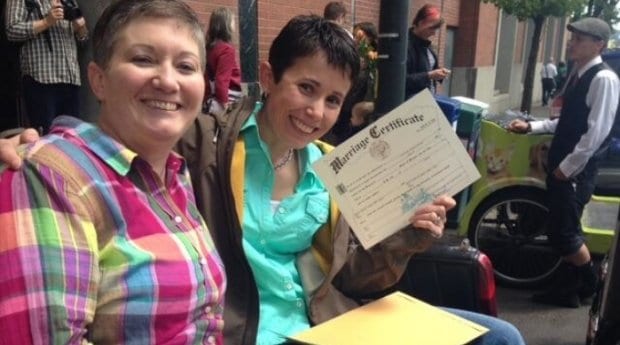“Where will this all lead? I know that many suggest we are going down a slippery slope that will have no moral boundaries. To those who truly harbor such fears, I can only say this: let us look less to the sky to see what might fall; rather, let us look to each other . . . and rise.”
So concluded Judge Michael McShane May 19 as he struck down Oregon’s constitutional amendment that banned gay marriage, ruling that it violated the equal protection clause of the 14th Amendment to the US Constitution.
McShane’s order stopping the ban’s enforcement took effect immediately, with no state officials giving notice that they would appeal the ruling. McShane rejected an attempt by same-sex marriage opponents, the National Organization for Marriage (NOM), to intervene in the case. The organization’s motion for stay was also denied by the US Court of Appeals for the 9th Circuit May 19.
In his decision, McShane observes that it is sometimes challenging to “see past the shrillness of the debate” over gay marriage.
“Accusations of religious bigotry and banners reading ‘God Hates Fags’ make for a messy democracy and, at times, test the First Amendment resolve of both sides,” he writes. “At the core of the Equal Protection Clause, however, there exists a foundational belief that certain rights should be shielded from the barking crowds; that certain rights are subject to ownership by all and not the stake hold of popular trend or shifting majorities.”
Referring to the four plaintiff couples in the case as people who demonstrate “the characteristics of a loving and supportive relationship,” McShane notes that none of the ideals “we attribute to marriage are spousal prerequisites under Oregon law.
“In fact, Oregon recognizes a marriage of love with the same equal eye that it recognizes a marriage of convenience,” he continues. “It affords the same set of rights and privileges to Tristan and Isolde that it affords to a Hollywood celebrity waking up in Las Vegas with a blurry memory and a ringed finger. It does not, however, afford these very same rights to gay and lesbian couples who wish to marry within the confines of our geographic borders.”
He concludes, “I believe that if we can look for a moment past gender and sexuality, we can see in these plaintiffs nothing more or less than our own families. Families who we would expect our Constitution to protect, if not exalt, in equal measure.”
Meanwhile, in Pennsylvania, Judge John Jones is also expected to issue a highly anticipated ruling about that state’s gay-marriage ban today, May 20.


 Why you can trust Xtra
Why you can trust Xtra


